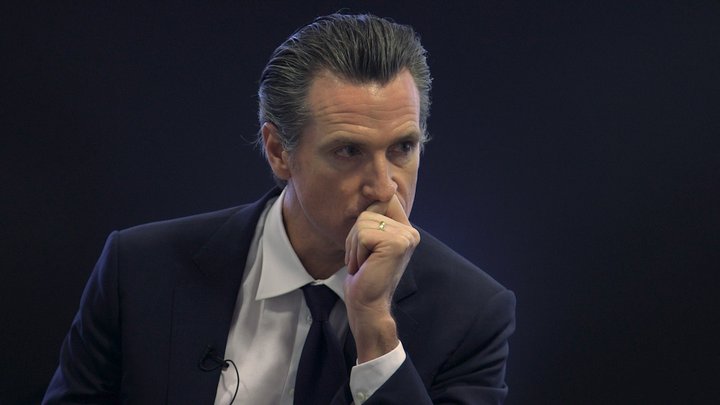
Gov. Gavin Newsom signed an executive order today putting a moratorium on the death penalty in California and shuttering the execution chamber at San Quentin, a move that overrides a decision the state’s voters made in 2016 to maintain capital punishment.
While campaigning for governor last year, Newsom said he was fervently opposed to the death penalty but didn’t “want to get ahead of the will of the voters” and wanted to “give the voters a chance to reconsider.”
This morning, he said he changed his mind because his decision whether to permit executions had become more urgent. The state’s lethal injection protocol was getting closer to being finalized and two dozen death row inmates had exhausted their appeals.
“I’ve had to process this in a way that I didn’t frankly anticipate a few months ago. It was an abstract question. (It became) a very real question,” Newsom said at a press conference in the Capitol.
“I cannot sign off on executing hundreds and hundreds of human beings.”
Under the governor’s reprieve, all 737 people on death row will remain in prison and, on paper, sentenced to death. But executions will be halted as long as Newsom remains governor. A future governor would have the power to change their fate.
Newsom’s executive order argues that the death penalty is unfair, applied disproportionately to people of color and people with mental disabilities. It says innocent people have been sentenced to die, including five Californians since 1973 who were found to have been wrongfully convicted.
12:45pm: The death chamber at San Quentin. Closed. pic.twitter.com/0zK4UUItBG
— Office of the Governor of California (@CAgovernor) March 13, 2019
His move is part of a larger swing in California away from tough-on-crime policies. In the last decade, Democrats who control state government and the state’s largely liberal voters have embraced policies to eliminate the use of money bail, reduce some non-violent felonies to misdemeanors and legalize marijuana.
But the death penalty so far has been politically untouchable—repeatedly favored by voters despite their progressive tendencies on other issues. In 2016, California voters passed a ballot measure to expedite executions and defeated a measure to end the death penalty. Voters also defeated a 2012 measure to end the death penalty.
A leading supporter of the death penalty said Newsom’s action is legal but “contrary to basic democratic principles.”
“The decision of whether we will have the death penalty or not is one the people have made over and over again through the initiative process,” said Kent Scheidegger, legal director of the Criminal Justice Legal Foundation, which advocates for capital punishment.
“It’s improper for an executive to use the reprieve power to frustrate the people’s position.”
GOP Assemblyman Tom Lackey said Republicans were looking for a way to reverse Newsom’s action but hadn’t yet figured out how. He criticized Newsom for changing his position from the campaign but ruled out an effort to launch a recall.
“He’s said conflicting statements. That’s how you lose trust,” said Lackey, of Palmdale.
It appears Californians may yet have another chance to weigh in.
Democratic Assemblyman Marc Levine has introduced a measure that would, if approved by two-thirds of the Legislature, put the question on the ballot in 2020. He said having a governor campaign against the death penalty could make the difference in convincing voters to repeal it.
“We’ve never before had that type of leadership on one of these initiatives,” said Levine, of San Rafael. “We are going to learn from those failures….How do we do this right? How do we administer justice properly?”
Death penalty opponents urged Jerry Brown to grant a reprieve when he was governor, but he never did, despite his personal opposition to capital punishment. They have been lobbying Newsom to do the same since he was sworn-in in January.
Now they have their sights set on the next goal, said longtime anti-death penalty advocate Natasha Minsker: “The next step would be to go further and convert death sentences to life without parole.”
CLICK TO MANAGE